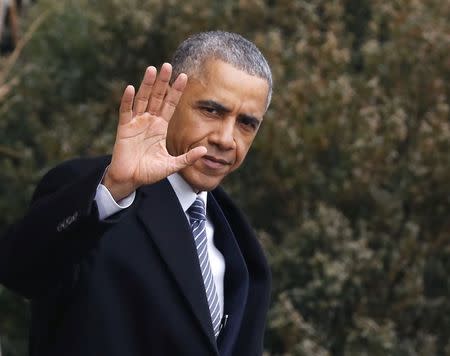After defiant speech, Obama heads to Republican heartland

By Jeff Mason WASHINGTON (Reuters) - A day after delivering a defiant State of the Union speech to the Republican-led U.S. Congress, President Barack Obama hit the road on Wednesday to promote his plans for lifting up the middle class. Obama headed out for a two-day trip to Idaho and Kansas to push his message that the economy has effectively recovered from years in the doldrums. No longer restrained by having to face voters again, Obama struck a highly confident tone in his State of the Union address on Tuesday night, saying, "the shadow of crisis has passed." It is now time for policies like raising taxes on the rich and offering community college for free for two years, he said. The Democrat threatened to veto Republican efforts to roll back key decisions such as the Obamacare healthcare law and the loosening of immigration policy, and the administration's refusal to approve the planned Keystone XL oil pipeline. Republicans called for Obama to be more humble, given that they took control of both chambers of Congress this month after winning November's midterm elections handsomely. "We've only been here 2-1/2 weeks, and he's put seven veto threats. I think that's probably not the best start. Let us work the legislation before you decide something's going to be vetoed," House of Representatives Majority Leader Kevin McCarthy said on the CBS "This Morning" program. McCarthy said Republicans are willing to work with Obama on issues like tax reform and trade. "Tax reform would be the best opportunity. Everybody's for simplifying the tax code. The president wants to raise more taxes. We do not agree with that. But simplification, closing the loopholes, I think that's a common ground that we can find and work towards," he said. Treasury Secretary Jack Lew said on Wednesday that after recent talks with Republicans he was confident a business tax reform plan can make it through Congress. Lew put the chances of passage at "better than 50-50." He elaborated on the administration's tax plan, including a lower top corporate rate, ensuring more taxes are paid on foreign earnings, and closing a host of loopholes. TRIP TO HEARTLAND Lew's comments were part of a White House drive to push home Obama's State of the Union messages. Obama left for Idaho and Kansas, two strongly Republican states in the heartland. He will make a speech at Boise State University in Idaho later Wednesday. In his State of the Union address, Obama told lawmakers and millions watching on television that it was time to "turn the page" from recession and war, and work together to boost the middle-class Americans who have been left behind. His vision of a stronger and more expensive safety net for middle-class and poor Americans stands little chance of becoming law this year, but it could shape the debate for the 2016 presidential election. Hillary Clinton, the likely frontrunner for the Democratic nomination, is already facing heat from Massachusetts Senator Elizabeth Warren and others on the left, who worry Clinton may bow to pressure from Wall Street and not push enough of a populist agenda on the economy. In a post on Twitter after the speech, Clinton wrote: "@BarackObama #SOTU pointed way to an economy that works for all. Now we need to step up & deliver for the middle class. #FairShot #FairShare". Obama called attention on Tuesday to rising U.S. wages and noted that more small business owners planned to raise pay than at any other time since 2007. But government data suggested actual wage increase are stuck in low gear. Multiple government surveys suggest income growth remains much slower than before the 2007-09 recession. Average hourly earnings in the private sector rose just 1.7 percent in the year through December, according to the U.S. Labor Department. (Additional reporting by Doina Chiacu, Jason Lange, Howard Schneider and Susan Heavey; Writing by Alistair Bell; Editing by Jeffrey Benkoe)

